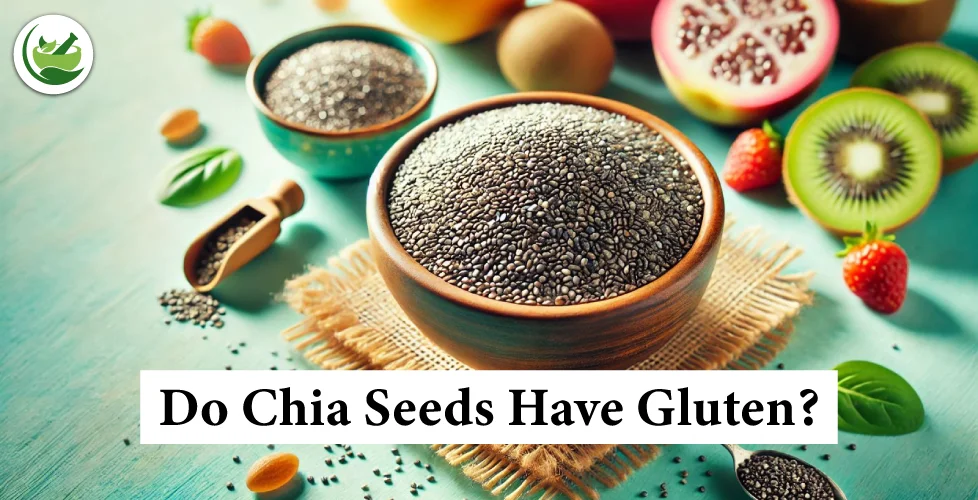Chia seeds(Salvia hispanica) have become a popular superfood, known for their impressive nutritional profile and health benefits. However, for those with gluten intolerance or celiac disease, it’s crucial to understand whether chia seeds contain gluten. This blog will delve into the content of chia seeds and explore their benefits for a gluten-free diet.
Related blog How to Make the Perfect Oatmeal with Chia Seeds

Understanding Gluten and Gluten Intolerance
Wheat, barley, and rye contain gluten, a protein that can cause digestive issues for people with gluten intolerance or celiac disease, an autoimmune disorder.
What is Gluten?
Gluten is a protein found in wheat, barley, and rye. It gives dough its elasticity and helps it rise.
Foods like bread, pasta, and cereals typically contain gluten.
Gluten Intolerance and Celiac Disease
Gluten intolerance, also known as non-celiac gluten sensitivity, causes symptoms like bloating, diarrhea, and stomach pain.
Celiac disease is an autoimmune disorder where gluten intake leads to damage in the small intestine, causing severe symptoms and long-term health issues.
Related blog What Can You Put Chia Seeds In? Breakfast, Lunch, and Dinner Ideas
Are Chia Seeds Gluten-Free?
Chia are naturally gluten-free, making them an excellent choice for individuals with gluten intolerance or celiac disease. Rich in fiber, omega-3 fatty acids, and various essential nutrients, chia seeds are a versatile and nutritious addition to any diet.

Gluten Content in Chia Seeds
Chia seeds are naturally gluten-free.
They are derived from the Salvia hispanica plant, which is unrelated to gluten-containing grains.
Cross-Contamination Concerns
While chia seeds themselves are gluten-free, they can be contaminated with gluten during processing.
Purchase chia seeds labelled as gluten-free to ensure they haven’t been exposed to gluten during manufacturing.
Related blog Are Chia Seeds Gluten-Free? Health Benefits, Dietary Recommendations, And Tips
Nutritional Profile of Chia Seeds
Chia seeds are a nutritional powerhouse, offering a wealth of essential nutrients in a small package. Their impressive profile includes high levels of fiber, omega-3 fatty acids, protein, antioxidants, and important minerals, making them a valuable addition to any diet.
Rich in Nutrients
High in omega-3 fatty acids, fiber, protein, and essential minerals like calcium, magnesium, and phosphorus.
Excellent source of antioxidants.
Health Benefits
Supports heart health by reducing inflammation and lowering cholesterol levels.
Promotes digestive health due to high fiber content, aiding in regular bowel movements.
Helps in weight management by providing a feeling of fullness and stabilizing blood sugar levels.
Benefits of Chia Seeds for a Gluten-Free Diet
Incorporating chia seeds into a gluten-free diet offers numerous health benefits, from improved digestion and enhanced nutrient absorption to better heart health and weight management. These tiny, nutrient-dense seeds are a versatile addition to any meal, making them a valuable asset for those seeking gluten-free options.
Alternative to Gluten-Containing Foods
Chia seeds can be used as a substitute for gluten-containing grains in various recipes.
They can be added to smoothies, yogurts, and salads or used as an egg replacement in baking.
Nutrient Boost
For those on a gluten-free diet, it’s important to get enough nutrients that might be lacking due to the absence of fortified gluten-containing products.
Chia seeds provide a nutrient-dense addition to a gluten-free diet, ensuring a balanced intake of essential vitamins and minerals.
Versatility in Cooking
Chia seeds can be easily incorporated into many dishes, from breakfast to dinner.
Use them to make chia pudding, add them to baked goods, or use them as a thickening agent in soups and sauces.
Related blog How long do chia seeds last? Can chia seeds go bad?
How to Incorporate Chia Seeds into Your Diet
Incorporating chia seeds into your diet is easy and can significantly boost your nutritional intake. Here are some simple and delicious ways to add chia seeds to your daily meals.
Chia Pudding
Mix chia seeds with your choice of milk and sweetener. Let it sit overnight for a creamy, nutritious pudding.
Add fruits, nuts, and spices for variety.
Smoothies
Blend chia seeds into your morning smoothie for a nutrient boost.
You can add them directly or soak them in water beforehand.
Baking
Use chia seeds as an egg replacement by mixing one tablespoon of chia seeds with three tablespoons of water. Let it sit for a few minutes until it forms a gel-like consistency.
Add them to bread, muffins, and pancakes for added texture and nutrition.
Related blog How Much Health Benefits of Protein in Chia Seeds 1 Tbsp
Conclusion
Chia seeds are a gluten-free superfood that offers numerous health benefits, making them an excellent addition to a gluten-free diet. Their high nutrient content, versatility in cooking, and ability to enhance various dishes without gluten make them a valuable ingredient for those with gluten intolerance or celiac disease. Always ensure to buy certified gluten-free chia seeds to avoid cross-contamination and enjoy the myriad benefits they offer.
By incorporating chia seeds into your gluten-free diet, you can enhance your nutritional intake and enjoy a variety of delicious, healthful meals.






